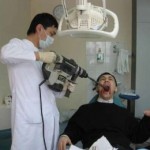 A surprising number of dental patients have questioned the billing procedures and diagnoses of their dentists. These comments are especially hard to sort out for a few reasons. For one, nobody likes going to the dentist, so it’s easy to come away with negative feelings. As well, many college students may be handling their dental insurance for the first time and may be unaware of how it works. Nonetheless, if any sort of fraud is occuring, it benefits everyone (everyone with teeth, and everyone who pays insurance premiums) to root it out.
A surprising number of dental patients have questioned the billing procedures and diagnoses of their dentists. These comments are especially hard to sort out for a few reasons. For one, nobody likes going to the dentist, so it’s easy to come away with negative feelings. As well, many college students may be handling their dental insurance for the first time and may be unaware of how it works. Nonetheless, if any sort of fraud is occuring, it benefits everyone (everyone with teeth, and everyone who pays insurance premiums) to root it out.
Questionable practices mentioned by patients:
- Charges exceeding the amount the dentist submitted to the insurance company. This is a violation of the contract between an insurance company and the dental office. Most insurances expect the patient to pay a portion of the fee (co pay). Just because a dentist accepts a certain insurance does not necessarily mean they are contracted with that insurance company. If a dentist accepts an insurance, but is not contracted with them, then the dentist will submit their usual and customary fee (which can be higher than a contracted fee) to the insurance company. The insurance then pays the dentist whatever is dictated by the patent’s plan and the patient is responsible to pay the difference.
 Diagnoses of cavities when none exist. (E.g. “you have eleven cavities”). This is particularly tricky because once a hole has been drilled, the evidence is gone. Also some dentists have different opinions of what needs a filling. Some dentists prefer to watch very small cavities (in hopes that they do not spread) and some dentists like to restore very small cavities.
Diagnoses of cavities when none exist. (E.g. “you have eleven cavities”). This is particularly tricky because once a hole has been drilled, the evidence is gone. Also some dentists have different opinions of what needs a filling. Some dentists prefer to watch very small cavities (in hopes that they do not spread) and some dentists like to restore very small cavities.- Charging for multiple cleanings or only cleaning half of a patients mouth. Sometimes the dentist or hygienist needs more than one hour to remove all the tartar from your teeth. Most insurances only cover 1 cleaning every 6 months and the patient has to pay out of pocket for the second cleaning. This is very frustrating to the patient if it is not explained, however, it does not constitute fraud.
- Not releasing records or x-rays to the patient. It is customary for dental offices to charge a nominal fee (usually about $30) for the duplication of x-rays. Dentists are required to release these records upon written request of the patient, they are not required to do so for free.
How to avoid dental fraud:
- Know what your insurance does and does not cover. (You are responsible for knowing what your insurance covers, not your dentist.)
- Get in touch with your insurance before paying any bill that you think is questionable. (Calling them afterwards is okay too.)
- Get a second opinion if you are suspicious of a diagnosis, especially if the diagnosis includes some major work that were never mentioned to you by another dentist before. Major dental work may include, but is not limited to, removing teeth or breaking the jaw to repair tooth placement (most dental plans cover second opinions).
- When is scaling and root planning needed? (The problem with scaling and root planing is at times they have both become an item together. However, there is a fine line to limit the extent of treatment planning by your dentist. Scaling is indicated when the calculus deposits are lined up at or above the level of the gum. The teeth in question do not show signs of severe gum disease like tooth mobility and deep pocketing. This procedure is usually done as prophylaxis; that is to prevent further progression to a more severe form of gum disease.
 Scaling AND Root Planing is done once signs of severe gum disease are detected. Gingivitis if left unchecked can and will progress to periodontitis, a more severe form of gum disease. The hallmarks of periodontitis are bone loss, deep pocketing and tooth mobility. Scaling is done below the gumline, in order to remove bacterial deposits and toxins. This is the succeeded by root planing which attempts to scrape of infected cementum on the root of the tooth, and smoothen the roughened surfaces of the root. This is to prevent those rough surfaces from becoming a plaque stagnating area. As such, a procedure like this is expected to cost significantly more as well as require a longer appointment duration.)
Scaling AND Root Planing is done once signs of severe gum disease are detected. Gingivitis if left unchecked can and will progress to periodontitis, a more severe form of gum disease. The hallmarks of periodontitis are bone loss, deep pocketing and tooth mobility. Scaling is done below the gumline, in order to remove bacterial deposits and toxins. This is the succeeded by root planing which attempts to scrape of infected cementum on the root of the tooth, and smoothen the roughened surfaces of the root. This is to prevent those rough surfaces from becoming a plaque stagnating area. As such, a procedure like this is expected to cost significantly more as well as require a longer appointment duration.)
Note on ethics of accusations
While we all want to stop dental fraud, it is important to keep in mind that any unfounded accusations can be very damaging to a potentially upstanding practitioner. For this reason, it is important to be absolutely certain a practice is fraudulent or unethical before leveling accusations.